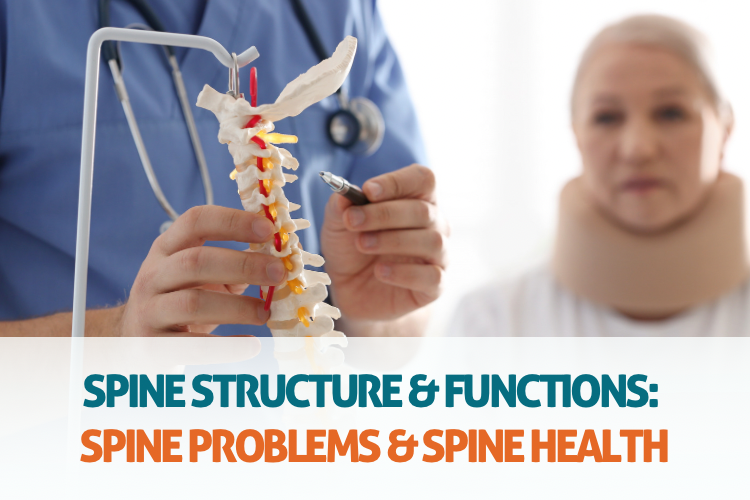Spine Structure & Functions: Spine Problems & Spine health.

The spine, also known as the vertebral column or backbone, is a complex structure consisting of 33 vertebrae, separated by intervertebral discs, and supported by muscles, ligaments, and tendons. It is an essential component of the human body, providing support and stability for the torso, head, and arms, while allowing movement and flexibility.
Our team of experts from Manvi Hospitals in Vijayawada will provide a comprehensive overview of the structure and functions of the spine, as well as problems that affect the spine and how to maintain spine health.
Structure and Functions of the Spine:
The spine is divided into five regions: cervical, thoracic, lumbar, sacral, and coccygeal. Each region has a specific number of vertebrae and a unique structure that allows it to perform different functions.
- Cervical Spine: The cervical spine consists of seven vertebrae and supports the weight of the head. It allows for a range of motions, including tilting, rotating, and bending forward and backward.
- Thoracic Spine: The thoracic spine has 12 vertebrae and provides support for the ribcage and chest. It is less flexible than the cervical spine and allows only limited movement.
- Lumbar Spine: The lumbar spine consists of five vertebrae and bears most of the body’s weight. It provides flexibility for bending, twisting, and lifting.
- Sacral Spine: The sacral spine is made up of five fused vertebrae and connects the spine to the pelvis.
- Coccygeal Spine: The coccygeal spine has four fused vertebrae and forms the tailbone.
The spine has many functions, including supporting the weight of the body, protecting the spinal cord and nerves, allowing movement and flexibility, and providing stability and balance. It also serves as a shock absorber, helping to reduce the impact of everyday activities such as walking, running, and jumping.
Spine Problems and Spine Health:
The spine is susceptible to a range of problems, including spinal cord injuries, herniated discs, spinal stenosis, and osteoporosis. These conditions can cause pain, numbness, tingling, and weakness, and can significantly impact a person’s quality of life.
Maintaining good spine health is essential to prevent spine problems and maintain a healthy, active lifestyle. Some simple tips given by neurological experts at Manvi Hospitals for maintaining spine health include:
- Exercise regularly: Regular exercise can help keep the spine strong, flexible, and healthy. It can also help prevent spine problems such as osteoporosis and herniated discs.
- Practise good posture: Good posture can help prevent back pain and spine problems by reducing stress on the spine and supporting its natural curves.
- Maintain a healthy weight: Excess weight can put added pressure on the spine, increasing the risk of spine problems.
- Lift heavy objects correctly: When lifting heavy objects, use proper lifting techniques to avoid straining the back and causing spine problems.
- Sleep on a supportive mattress: A supportive mattress can help maintain proper spine alignment during sleep, reducing the risk of spine problems.
A note from Manvi Hospitals In Andhra Pradesh
The spine is a complex structure that performs many essential functions in the human body. Maintaining good spine health is essential to prevent spine problems and maintain an active, healthy lifestyle. By following simple tips such as exercising regularly, practising good posture, maintaining a healthy weight, lifting heavy objects correctly, and sleeping on a supportive mattress, you can keep your spines healthy and strong.
At Manvi Hospitals, our healthcare providers can help ease your spine problems and provide suggestions to strengthen your spine health.
Book an appointment online from the Manvi Hospitals website, or call on 9391176126, 0866 – 243 8999, 243 8998.

Leave a comment